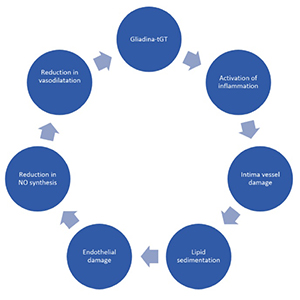Coeliac and cardiovascular disease: a possible relationship between two apparently separate conditions

All claims expressed in this article are solely those of the authors and do not necessarily represent those of their affiliated organizations, or those of the publisher, the editors and the reviewers. Any product that may be evaluated in this article or claim that may be made by its manufacturer is not guaranteed or endorsed by the publisher.
Accepted: 17 July 2022
Authors
Coeliac disease (CD) is an autoimmune condition with a high prevalence among general population and multisystemic involvement: a more complex scene than a merely gastrointestinal disease. Therefore, an early diagnosis and treatment with a gluten-free diet is mainly important to reduce mortality and comorbidities. Together with autoimmune diseases (as Hashimoto thyroiditis, insulin-dependent diabetes mellitus, autoimmune liver disease and connective tissue diseases), also an accelerated progression of atherosclerosis and a higher prevalence of heart disease have been reported in coeliacs. In the present paper we tried to collect from literature the emergent data on the probable relationship between coeliac and cardiovascular disease, focusing on pathophysiological bases of vascular injury. Data and opinions on the development of cardiovascular risk in patients with CD are conflicting. However, the major evidence supports the theory of an increased cardiovascular risk in CD, due to many mechanisms of myocardial injury, such as chronic malabsorption, abnormalities of intestinal permeability, and direct immune response against self-proteins. The conclusions that come from these data suggest the utility of a careful cardiovascular follow up in coeliac patients.
How to Cite

This work is licensed under a Creative Commons Attribution-NonCommercial 4.0 International License.






